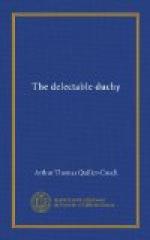“Said the weather-glass was risin’, but too fast to put faith in.”
“I mean, did he ask any more about me?”
“Iss: wanted to know if you was married. I reckon he meant that for a bit o’ pleasantness.”
“Not that! Ah, not that!”
Job laid down knife and fork with their points resting on the rim of his plate, and, with a lump of pasty in one cheek, looked at his sister. She had pushed back her chair a bit, and her fingers were plucking the edge of the table-cloth.
“Not that!” she repeated once more, and hardly above a whisper. She did not lift her eyes. Before Job could speak—
“He was my lover,” she said, and shivered.
“Mar—ty—”
She looked up now, hardened her ugly, twitching face, forced her eyes to meet her brother’s, and went on breathlessly—
“I swear to you, Job—here, across this table—he was my lover; and I ruined ’en. He was the only man, ’cept you and father, that ever kissed me; and I betrayed ’en. As the Lord liveth, I stood up in the box and swore away his name to save mine. An’ what’s more, he made me.”
“Mar—ty Lear!”
“Don’t hinder me, Job. It’s God’s truth I’m tellin’ ’ee. His folks were a low lot, an’ father’d have broken every bone o’ me. But we used to meet in the orchard ’most every night. Don’t look so, brother. I’m past sixty, an’ nothin’ known; an’ now evil an’ good’s the same to me.”
“Go on.”
“Well, the last night he came over ‘twas spring tides, an’ past the flood. I was waitin’ for ’en in the orchard, down in the corner by the Adam’s Pearmain. We could see the white front o’ the house from there, and us in the dark shadow: and there was the gap handy, that Amos could snip through at a pinch—you fenced it up yoursel’ the very summer that father died in the fall. That night, Amos was late an’ the dew heavy, an’ no doubt I lost my temper waitin’ out there in the long grass. We had words, I know; an’ I reckon the tide ran far out while we quarrelled. Anyway, he left me in wrath, an’ I stood there under the appletree, longin’ for ‘en to come back an’ make friends again. But the time went on, an’ I didn’ hear his footstep—no, nor his oars pullin’ away—though hearkenin’ with all my ears.
“An’ then I heard a terrible sound.” Miss Marty paused and drew the back of her hand across her dry lips before proceeding.
“—a terrible sound—a sort of low breathin’, but fierce; an’ something worse, a suck-suckin’ of the mud below; an’ I ran down. I suppose, in his anger, he took no care how he walked round the point (for he al’ays moored his boat round the point, out o’ sight), an’ went wide an’ was taken. There he was, above his knees in it, and far out it seemed to me, in the light o’ the young moon. For all his fightin’, he heard me, and whispers out o’ the dark—
“‘Little girl, it’s got me. Hush! don’t shout, or they’ll catch you.’




